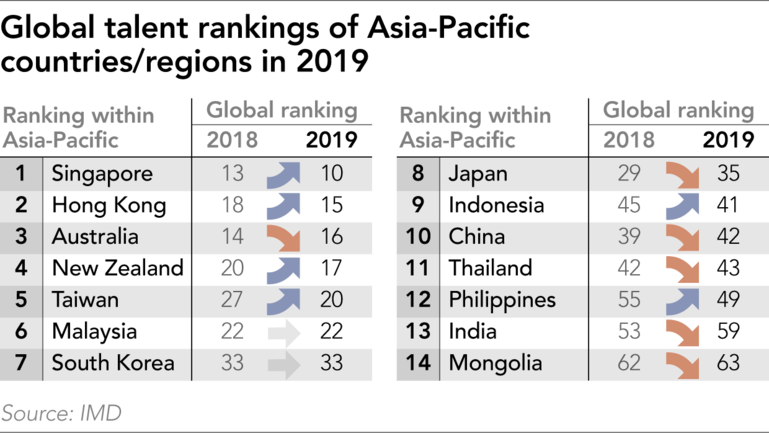The Swiss IMD (International Institute for Management Development) report evaluates the quality of a country’s talent pool as well as its efforts in developing local talent, or its ability to attract overseas workers, and ranks countries by three main categories: investment and development, appeal, and readiness.
Singapore’s No.1 position derives mainly from the measure of readiness. The country has a high percentage of science graduates and has also received high scores under the Program for International Student Assessment — a worldwide study conducted by the Organization for Economic Cooperation and Development, in which students are tested in mathematics, science and reading.
The effectiveness of its primary and secondary education was also a reason for Singapore’s high ranking.
Hong Kong is No.2 having jumped three ranks in the global ranking table since last year and Taiwan – No.5 in the Asian rankings – went up from 27th last year to 20th this year in the global rankings.
Hong Kong earned high scores in the readiness category, while achieving solid results in the other two categories. Its strengths, according to the report, “include the female percentage of the total labor force” and “the availability of competent senior managers.”
Taiwan made progress, particularly in terms of the “availability of finance skills” and “senior managers with international experience.”
Meanwhile, Japan, China and India all slipped in this year’s ranking. Japan, No.8 in the Asian rankings, dropped six spots to 35th on the global rankings – lower than South Korea for the first time.
Japan scored lower than previously in employee training, as well as in terms of the effectiveness of its health infrastructure. The report also pointed out that the country had experienced a slump in worker motivation. Subpar results regarding the availability of senior managers with significant international experience or language skills also dragged on its score in the readiness category.
India ranked 59th in the global rankings , six spots lower than last year. The fall was largely due to low scores in the appeal category, with issues such as pollution causing the quality of life to drop, thus failing to attract or retain talent within its economy.
China, which is No.10 in the Asian rankings, dropped three spots to 42nd place in the global rankings – its lowest rank since 2016. Although there were some improvements under the appeal heading, such as the levels of worker motivation and more positive opinion among global executives about the skills available in the country, low scores in the appeal category dragged the overall ranking down.
 Electronics Weekly Electronics Design & Components Tech News
Electronics Weekly Electronics Design & Components Tech News

